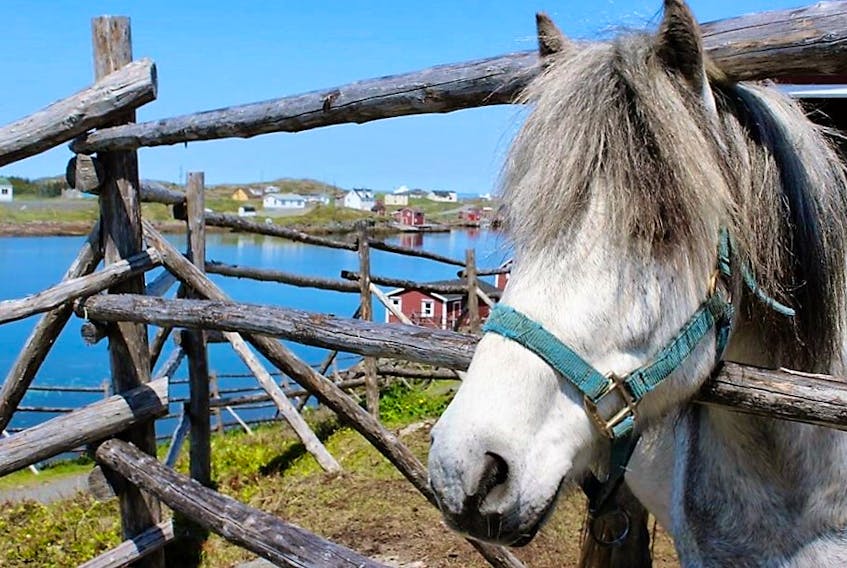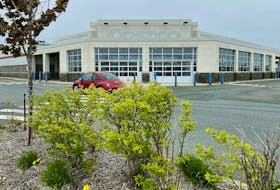Terry Dwyer stands next to a tractor he purchased to develop land and harvest hay for his Newfoundland ponies.
However, the weeds have grown around its wheels and it’s easy to tell it has been some time since it moved. It’s because Dwyer has never had the chance to use the piece of machinery.
The Gander resident has been separated from his 21 Newfoundland ponies for four years, as he has been unable to acquire the land he needs to care for them. He’s looking for 50 acres.
“Each horse is supposed to have one acre for pasture, and you’d want extra for winter feed,” he said. “If not, you’re going to be buying hay all winter long.”
Dwyer’s story started with a single stallion and a mare in British Columbia where he was living back in 1998. He would later add three mares, and during his time in in the western province, more than 20 foals were born.

The ponies were brought back to Newfoundland four years ago, when Dwyer trucked them across the country.
But finding 50 acres of land has been difficult, and now his 21 ponies are being cared for at different farms throughout the province, along with the six that are in Nova Scotia.
“It’s costing me a fortune to keep them at these places,” Dwyer said. “One of those round bales of hay delivered to your door is 100 dollars. I had 10 mares eating 12 of those a month last winter. That’s $1,200 per month, and that’s only 10 of them.”
He says access to suitable land would allow him to stable and care for the ponies himself at a much cheaper cost.
While he hasn’t placed an application with Crown Lands, Dwyer says he has had discussions with provincial government representatives about his cause, but without much luck.
According to the Department of Fisheries and Land Resources, which oversees Crown Lands, there are no resources in place to assist those who look after the province’s heritage animal.
“…There is no dedicated funding or program to support the maintenance of Newfoundland ponies on any pasture or to provide for the costs associated with their maintenance,” read a department-issued statement. “This would be the responsibility of their owners, as would be the case with any other horse owner.”
The department accepts applications for Crown Lands at Regional Lands offices throughout the province, and information regarding the suitability of pasture land is available through the department’s Land Management Division.
“Applications for agricultural leases are accepted for pasture lands but such applications for ponies are not common,” the statement read. “Any application for pasture land would require a suitable farm development plan.”
But the 54-year-old is determined to keep working towards a central location for his ponies.
“I don’t see my ponies very often, I wish I could get them all together.”
-Terry Dwyer, Newfoundland pony owner
Because, for Dwyer, it’s about the historic significance of the Newfoundland Pony.
“When I was a young feller in Harbor Grace there used to be lots of them. Now you can hardly find one. Without people like me there’s not going to be very many of these ponies left,” he said. “Who’s foolish enough to raise that many ponies for over 20 years and not make five cents on it?”
He’ll continue searching for a way to find a permanent home for his ponies.
“I’m still hoping and trying to get something set up for central Newfoundland,” he said. “I don’t see my ponies very often, I wish I could get them all together, if there’s any town or bay around central that can accommodate me, I’ll go.”
Support for the cause
Netta LeDrew, owner of the Newfoundland Pony Sanctuary on Change Islands, understands Dwyer’s frustrations.
It took LeDrew five years to acquire land for the sanctuary.
“It was a long struggle,” she said. “Identifying the right piece of land wasn’t easy.”
But she kept with it, and now the sanctuary houses 12 ponies. LeDrew certainly encourages Dwyer to continue his cause.
“The more people that can get involved with this the better,” LeDrew said. “I can certainly sympathize with Mr. Dwyer… and I would tell him to keep fighting.”
Jack Harris, president of the Newfoundland Pony Society, said Dwyer hasn’t reached out to the society for assistance, but the organization is willing to help where it can.
“We would certainly be interested in helping him if he has some land in mind and wanted to go through the process.”
RELATED:
Harbour Grace man hopes to save Newfoundland pony with breeding stallions









